Tree Farmer Stories
One of the benefits of membership in the N.C. Tree Farm Program is the opportunity to learn from other Tree Farmers. We share stories here written by or about some of our state’s many outstanding forest stewards.
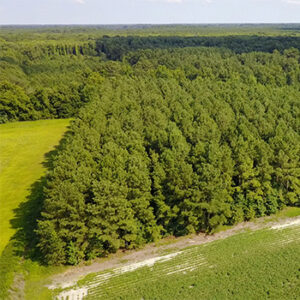 |
Tony and Louise FrancisMore than a century after his grandfather purchased the Hertford County land, Tony Francis and his wife, Louise, manage the Francis farm, carrying on the family’s farming legacy. Now called Delmar Farm, the property encompasses 380 acres, including 219 acres of Tree Farm certified woodlands. Their primary management goal for their Tree Farm is to have a sustainable forest operation, provide wildlife habitat through conservation practices and to ensure that the farm continues in their family for another 100 years. Read more. |
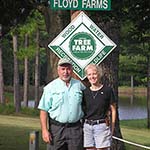 |
Preston and Susan FloydThe Floyds, 2017 Outstanding Tree Farmers of the Year, are partners in the day-to-day management of their Tree Farm properties in Vance County and do most of the work themselves. While they work hard to improve the health of their forests they also invest a lot of time in educating themselves about all aspects of forest management through research classes and engagement with resource professionals. Read more. Watch video. |
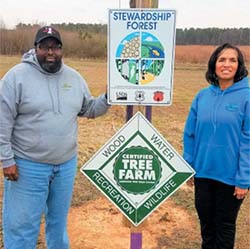 |
Tyrone and Edna Williams–FourTee AcresTyrone Williams squinted into the sun as he looked toward the newly planted tract of loblolly pines on his 62-acre property in Enfield….He thought about his ancestors and how they surely stood in this very same spot. He hoped that someday his children would inherit the land and stand here too. (By Elizabeth Greener) Read More.
|
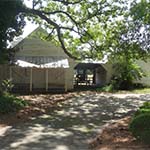 |
Johnson Family FarmThe R.L. Johnson farm was founded in 1780 and has been under continuous family ownership and operation for six generations. It is listed on the National Register of Historic Places, which describes the farm as “the most intact and expansive agricultural complex in Harnett County.” Watch video.
|
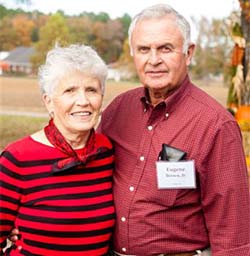 |
Eugene and Opal BrownEugene and Opal Brown’s Northampton County Tree Farm has been under a forest management plan and in the Tree Farm Program since 1961. Their goal is to harvest and reforest 40 to 50 acres a year and to leave the property in better shape than when they acquired it. Watch video. Brockfill, a company that produces organic engineered infill for athletes, featured the Browns’ Tree Farm in a video promoting sustainable forest management. Watch the video here.
|
 |
Rett DavisRett Davis, a Tree Farmer and past president of the N.C. Tree Farm Program, is a retired Alamance County Extension Director who writes a weekly Garden Column that often discusses forestry-related topics. Here are some of his stories about his experiences in the woods. Read More.
|
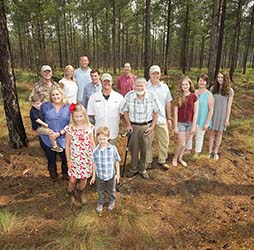 |
The McKay FamilyThe descendants of the late John L. McKay have cooperated across generations since the late 1700s to implement a true multiple resource management program. Read More.
|
 |
Andrew TaylorTree Farmer Andrew Taylor grew up on a farm that has been in his family since 1892. Andrew’s journey into stewardship began when he decided to sell timber on 100 acres of the 320-acre family farm. Read more in this article from Minority Landowner magazine.
|
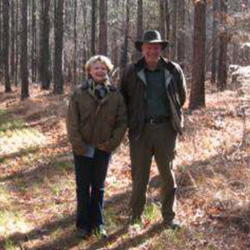 |
Alice and Riddick RicksIn August of 2011, Hurricane Irene hammered Northampton County in Eastern North Carolina, with winds of up to 80 miles an hour and 18 inches of rain. At Whispering Pines Wildlife Preserve, owned by North Carolina’s 2009 Tree Farmers of the Year Alice and Riddick Ricks, the storm hit just two weeks after they completed a 330-acre thinning operation. Read more of Alice and Riddick Ricks’s story. Watch video.
|
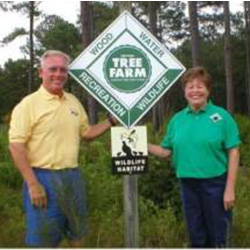 |
Judy and Dwight BattsManaging a tree farm is like painting a picture, Dwight Batts likes to say. For a picture—and a tree farm—you need a vision of what you want to create. “You begin by outlining where you want the different features to go,” he said. “Then you start painting it in, adding in the details.” But the key, he says, is the vision. Read more of Judy and Dwight Batts’s story. Watch a video about the Batts Farm. |
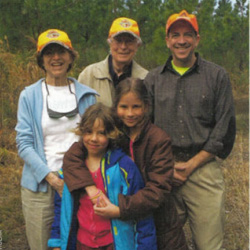 |
Hulka Family Tree FarmSlade Creek, the Hulka family’s 265-acre Tree Farm in Hyde County, is defined by the waters of a tributary to the Pungo River, which flows to the Pamlico River and Sound. “We have seen all sorts of natural phenomena when duck hunting there including porpoises swimming up the brackish water of the creek, river otters playing in our decoys, eagles circling and tundra swans coming in to check things out,” said Bryan Hulka, who manages the Tree Farm. Read more about Slade Creek.
|
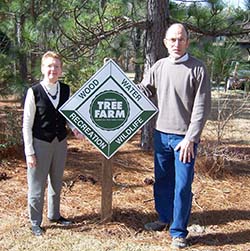 |
Boone and Mary ChessonBoone Chesson’s definition of play – planting trees, cutting or burning undergrowth and maintaining a creek crossing – translates to chores for most of us. A lot of people play golf, hunt and fish, but Chesson likes to play in his woods. Read More.
|
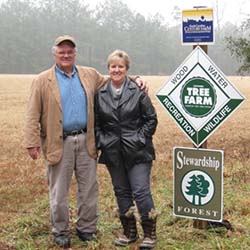 |
Albert and Wynette ShawAlbert Shaw refers to his checkerboard management approach on his farm as being busy, but many foresters would call it being smart. He is spreading out the risk and spreading out the income – or some might say, spreading out the taxes – by managing tracts in different ages. Read More. Watch video of Albert Shaw as he shares the story of his Tree Farm. |
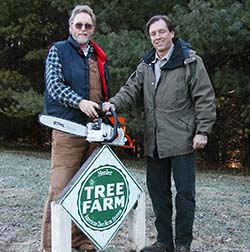 |
Bob VickeryWhile Vickery struggles with the notion that his tree farm is one of the state state’s best, it may be a classic example of failing to see the forest through the trees. Simply put, Bob Vickery doesn’t own his family farm, he is his family farm. It shaped his values and attitudes. Packed with memories, the farm is a living demonstration of what love for nature can occur over a long period of time. Read More. |
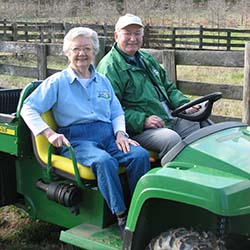 |
Bob and Jean CooperSitting on the screened porch of his historic home, Dr. Bob Cooper recalls with a smile the first time he had an unwanted visitor on the back half of his 165-acre farm that straddles Salem Creek just outside of Winston-Salem. “I heard the cows making a noise that usually meant something was wrong,” explained Cooper. “I headed out to investigate, and when I came through the trees, I came face-to-face with a creature I had never seen before in my life.” Read More. |
